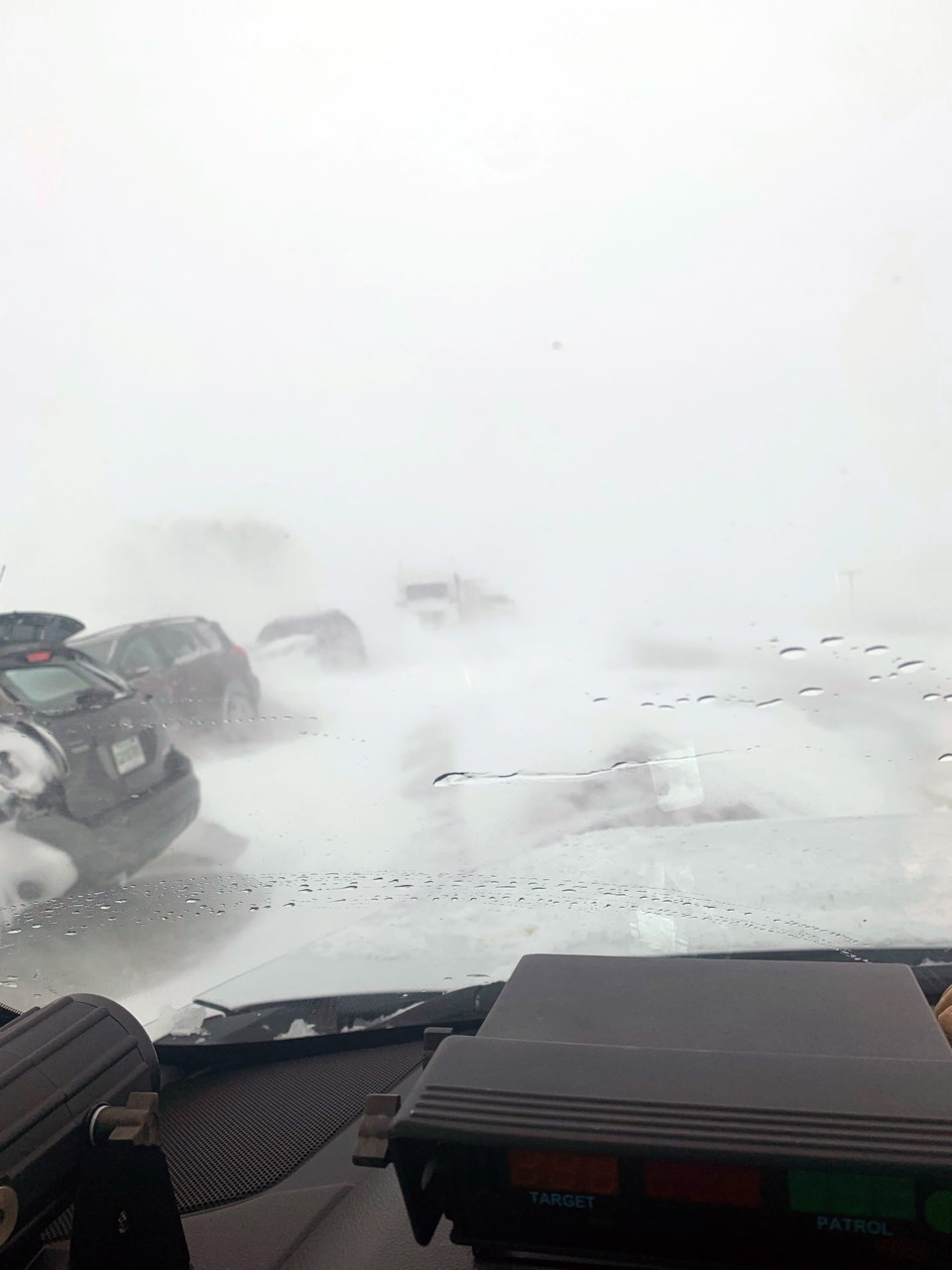REGINA — Saskatchewan is no stranger to poor winter weather, but this week’s overnight blizzard reminded RCMP, emergency responders and motorists that it’s important to be prepared for the worst.
More than 200 vehicles and semis were lined up on Highway 1 between Moose Jaw and Regina during Tuesday’s blizzard, and White Butte RCMP said they had the provincial search and rescue team on standby to provide aid.
“It was a situation where we were prepared for the worst, but thankfully, the worst didn’t happen,” said Constable Peter Rhead, White Butte RCMP, who was on scene.
The huge traffic backup, which stretched over five miles, was the result of a serious collision in the eastbound lane blocking the highway. Some of the vehicles in the resulting jam remained stopped for a significant amount of time, in whiteout blizzard conditions.
“Some of them were stopped for multiple hours, so the snow drifts were pretty high around them,” said Rhead.
White Butte RCMP officers were first on scene at approximately 10 a.m. on Nov. 16. As the storm worsened and safety concerns rose, officers were joined by Moose Jaw RCMP and officers from the Moose Jaw and Regina Combined Traffic Services Saskatchewan, to help monitor the safety of commuters.
No injuries were reported as a result of any of these collisions, but the extended traffic stop caused numerous other concerns, said RCMP, especially as weather conditions worsened.
Rhead said that drivers in the lineup were calling dispatch wondering when traffic may begin moving again, some citing concerns about being low on gas, others with children in their vehicle.
“We were prepared to bring fuel to vehicles if it was required, and to do whatever it took to make sure anyone in them was safe and comfortable,” says Cst. Rhead. “That included being prepared to potentially remove people from their vehicles – if that need was identified.”
Continued no-visibility conditions and dropping temperatures were a major concern, said Rhead.
Staff Sergeant Jason Suave, White Butte RCMP detachment commander, said the search and rescue team was being considered to potentially make those trips on snowmobile — bringing supplies like food, fuel or water to stranded drivers or evacuating anyone in medical distress.
“[They] were being considered based on a careful risk assessment of the storm continuing longer than anticipated and the concern of not being able to immediately bring in heavy equipment because of the weather,” said Suave.
The highway reopened to travel later that day at approximately 3 p.m., after it was deemed safe for motorists to continue travelling.
Suave said that the combined efforts of all first responders — including the multiple law enforcement detachments and the Ministry of Highways — was paramount to the positive outcome of the situation.
Moose Jaw RCMP acted quickly to blockade access to Highway 1 upon request of White Butte RCMP, said Suave, and Ministry of Highway loaders and tow trucks were instrumental in getting motorists moving again once able.
RCMP officers helped transport passengers who had to leave their vehicles road-side, and police tape abandoned vehicles that had already been cleared as empty.
“From a policing perspective, the teamwork was fantastic,” said Suave, who thanked all who provided aid during the situation.
Suave said the incident was a stark reminder to provincial officers to be ready to respond to evolving situations, like bad weather, and to drivers to keep themselves safe out there.
“Saskatchewan winter weather is unpredictable and this week was a reminder of this,” said Sauve.
He advised motorists to always check the weather forecast and road conditions before hitting the road, and to travel with a full tank of fuel in the winter.
He also recommended carrying some emergency items in the vehicle just in case — including extra warm clothes, snacks and water, a snow shovel, a tow rope or chain, booster cables and even an extra phone charger.




